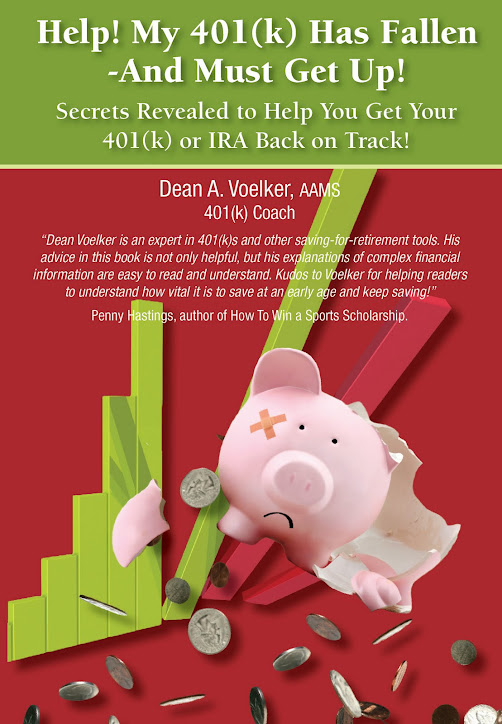I've been a bit busy this week, working on my upcoming book,
"Help! My 401(k) Has Fallen - And Must Get Up!" . This is an "everyman's" (and everywoman's) guide to getting more from your 401(k) plan. Most books I have seen on 401(k) plans really are geared more to advisors and financial people, which is what inspired me to write it.
For most of us, the 401(k) is a major source of our savings, and for some it may be the ONLY source of savings. We need to get more out of it if we want to retire someday and have our money last the rest of our lives. I'm very excited to contribute something unique - and hope others find it helpful.
Anyway, I plan on doing more with the blog and hope that my message finds the right people. Last week I wrote about
Blog Talk Radio. My experience with Blog Talk Radio has been great. I began using it in July 2009 on the advice of a friend of mine,
Brian Seim, a radio veteran.
Although I have made a TON of mistakes (and still do!), I must have done a few things right also. A few weeks ago I began an affiliation with
WHME-FM in South Bend (103.1) . We agreed to replay my interviews from
Blog Talk Radio as a 30 minute program on Saturday mornings -
"Improving Your Financial Health" .
If I had to pick the one factor which has made the show appealing - its the GUESTS! My guests have mostly been financial experts and authors, although some have been very interesting people with great personalities with no financial background at all. Even so, they had something of value to share with listeners and wer a lot of fun to talk with. Some examples would be
Ruben Gonzalez, a 4 time Olympian who has written 3 books on staying motivated, or
Charlie Adams, who is also a professional speaker and helps High School athletes to get college scholarships.
Kristen Harmel who has written 6 novels and has a passion for helping kids with reading,
Kay Yasin who overcame personal tragedies to change her life and is now an expert trainer and bodybuilder, and
Darin Pritchett who is well known in the South Bend area for his Weekday Sportsbeat show. These and many others are wonderful people and gave fun & interesting interviews. All would all be welcome guests in the future.
Once I committed myself to doing the program, I have always been on the lookout for people who would make great guests . When I find someone I like, I contact them and and tell them about the program and try to schedule a time for them to be on. Always let them know that you are doing this regularly (for me once a week) and tell them names of other guests I've interviewed.
Whatever you choose to do a program about - for business or for fun - I would certainly recommend having interesting guests that fit in with your message. Again,
the guests make the show fun. (Who would want to listen to just me for 30 minutes?)
People have often asked me where I find my guests. You can find guests in several places. My main source would be searching the internet for financial blogs or articles I also subscribe to
Money and
Smart Money magazines and have found great articles there.
Referrals can be a great source also once you tell others what you are doing. My friend, Nikki Stauffer in Ada, MI deserves a special mention. She has referred 2 nationally recognized financial experts and authors to me who are guests.
Eric Tyson (author of
"Investing for Dummies" and
"Personal Finance for Dummies") was one. There aren't many financial advisors out there who can say they have their own "jingle" written by Paul Shaffer of the David Letterman band. Another is
Robert Krakower, who has graciously agreed to be interviewed on March 23. His new book is titled
"Redefining Retirement for a New Generation".
By the way, Nikki Stauffer has a great weekly show of her own,
"Gather Round the Table" . She has also done pretty well with guests, including Megyn Price (Rules of Engagement), Maria Canals-Barrera (Wizards of Waverly Place), and Mayim Bialik (Blossom), among others. This program promotes the importance of family values by eating meals together, and Nikki's guests normally share one of their favorite recipes. Check out her site and archived interviews at
http://www.gatherroundthetable.com/.
I also need to thank
Erica Sandberg one of my early guests, and author of
"Expecting Money", for her referral of a colleague of hers,
Sally Herigstad, CPA, and author of
"Help! I Can't Pay My Bills!". Both ladies were wonderful guests and I look to have them on
Blog Talk Radio again.
Pam Batcho of
Express Pros, also has been a great referral source. She referred
Ruben Gonzalez, whom I mentioned earlier and also her boss,
Norm Robertson, owner of the local Express Pros branch.
Sometimes, it pays to be persistant.
Anya Kamenetz was a young lady I had really admired from reading her first book, "Generation Debt" a few years ago. It highlights the challenges of being young today, especially with the high costs of college and student loans. Anya was nominated for a Pulitzer Prize for her efforts.
She is also a nationally recognized speaker, and has appeared on college campuses nationwide.
I knew Anya would make a great guest, and tried to e-mail her (4 times over 6 weeks) with no reply. Finally one day out of the blue, I got a very kind note from her. She apologized that she had been out of town and wasn't getting her e-mails. She also sent me her personal e-mail and agreed to an interview. The interview went great and it was quite an honor for me.
Whoever the guest is, I really try to be respectful of their time. I really want to make sure the experience goes well for them - I may want to have them back sometime, or want their help with a project.
Before doing a program, I send the guest specific instructions confirming the date and time and Call-In phone number. Since some of my guests live in different parts of the country, I also make sure I note EST - and whatever time it may be for them.
1:00 pm here is 10:00 am in California. That may seem like a small thing, but trust me - its important!
Another habit of mine is to send the guest a list of questions personally tailored to them. Some guests have even suggested questions that the like to be asked. By reviewing their website or reading their books, it has helped me quite a bit to learn about them. It helps the interview to go more smoothly.
My objective is to build them up as an expert which (I hope) makes me look like a good guy as well. Speaking of building up, its also very important to use a proper introduction. A good introduction should be at least 3 sentences, highlighting their achievements. You are telling your listeners why you chose this person to be on your show and why their advice will be valuable to them.
One last point on guests - You can't say
"Thank You" enough. I always thank them at the end of the program and give them a chance to give contact information and promote their book or services . After the show, I also send an e-mail thanking them for their time once more.
Blog Talk Radio has been a great venue for me. I plan on writing one more article about Blog Talk Radio, which includes tips and techniques. You can contact me through my website,
http://www.helpmy401k.us/ and
through
Linked In or
Twitter.
There is a Free Report now available through my website,
"The 5 Biggest Problems With 401(k)s - And How To Fix Them". Please contact me to receive your free copy. This is a sample of my upcoming book,
"Help! My 401(k) Has Fallen - And Must Get Up!"















